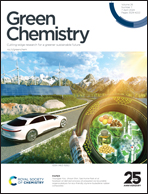Solvent-free chemical upcycling of poly(bisphenol A carbonate) and poly(lactic acid) plastic waste using SBA-15-functionalized basic ionic liquids†
Abstract
Chemical upcycling of plastic waste has garnered global attention due to its sustainable approach to addressing the growing plastic waste accumulation problem and facilitating the establishment of a circular plastic economy. Methanolysis is a chemical upcycling process for the depolymerization of post-consumer polycarbonates and polyesters into their monomeric feedstock, which generally requires an excess amount of co-solvents and homogeneous inorganic salts. Herein, a solvent-free heterogeneous catalytic chemical upcycling of poly(bisphenol A carbonate) (BPA-PC) and poly(lactic Acid) (PLA) is proposed for the production of bisphenol A (BPA) and methyl lactate (ML) with a high yield using SBA-15 functionalized basic ionic liquid catalysts. Among all the synthesized catalysts, SBA-15-Pr-MIM-OH exhibited the highest basicity and demonstrated the best performance for depolymerization of PC and PLA at 120 °C, completing the reaction in 1 h and 4 h, respectively, with a complete conversion and a monomer yield of >98%. The reaction condition was optimized to get the best catalytic performance and product selectivity. Furthermore, the “one-pot” depolymerization strategy was applied for the chemical upcycling of mixed plastic waste (BPA-PC/and PLA) to their monomers. A detailed depolymerization pathway is provided, supported by FT-IR spectroscopy, 1H NMR spectroscopy, and TGA. The parameters for green chemistry metrics were evaluated to show the efficiency and sustainability of the proposed system, opening doors for the industrial upscaling of plastic depolymerization.



 Please wait while we load your content...
Please wait while we load your content...